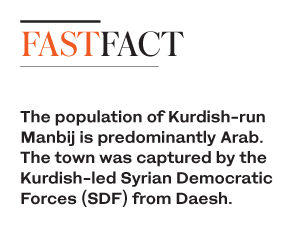ANKARA: Some Arab tribes in Manbij have called for Turkish military intervention in the northern Syrian town against the Kurdish People’s Protection Units (YPG), Syrian sources told Arab News.
The YPG’s call for compulsory enlistment was the last straw for prominent Arab tribes such as the Baghara and Ghanaim, the sources said.
Other grievances include discrimination against local Arabs and their displacement from some Arab-majority villages, the sources added.
Located 20 miles south of the Syrian-Turkish border, the population of Kurdish-run Manbij is predominantly Arab. The town was captured by the Kurdish-led Syrian Democratic Forces (SDF) from Daesh. The Bushban tribe expressed in a statement its determination to liberate Manbij from Kurdish rule.
The Bushban tribe expressed in a statement its determination to liberate Manbij from Kurdish rule.
The Bani Said, Naim, Fennel, Popna, Aldamalkh, Majadameh and Al-Bustalan tribes followed suit with their own statements, as did a Turkmen tribe.
Mohammed Najouma, deputy head of the Stabilization Committee in Aleppo governorate, which runs areas captured from Daesh and the SDF, said the region will not be stable until the YPG withdraws from Manbij.
“They’re carrying out raids, illegally arresting tribe members, assassinating anyone who dares oppose their policies, and forcing people to join demonstrations in favor of the YPG,” he told Arab News.
In line with a road map agreed by Turkey and the US, troops from both countries began conducting joint patrols in Manbij from Nov. 1.
As part of the deal, the YPG, seen by Ankara as a terrorist group, is expected to withdraw from the town, and a new governing council is expected to be formed by local Arabs.
In June, the Popna tribe, the largest in Manbij, welcomed the road map and expressed support for Turkish patrols in the area.
But Washington’s insistence on maintaining its partnership with the YPG despite local opposition may shake regional balances and undermine the already fragile implementation of the roadmap, experts told Arab News.
“Given the demographic characteristics of the region and the refusal of local tribes to have the YPG in their areas, any partnership with it means ignoring local and regional interests, and will lead to the escalation of tensions and the return of extremism under different forms,” Najouma said.
Ammar Hamou, a Jordan-based Syrian journalist, said Arab tribes believe that the YPG is a temporary authority, so siding with it out of fear will not benefit them in the long run and may provoke tensions between them and other Arab tribes.
The US partnership with the YPG will end as soon as the threat from Daesh is completely eliminated, he added.
“We’ve witnessed civil disobedience and closure of shops in protest against the YPG in Manbij,” Hamou told Arab News.
“Local opposition voices are becoming stronger, and this could be an excuse for Ankara to enter Manbij as it did before in Afrin.”
Last week, Turkey’s Foreign Minister Mevlut Cavusoglu urged the US to complete implementation of the road map for Manbij by the end of this year.




